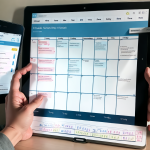Understanding Dopamine’s Effects on the Lives of Students
Being a key neurotransmitter in the sense of pleasure and reward, dopamine is sometimes referred to as the “feel-good” neurotransmitter in the brain. The functions of motivation, memory, and attention—all critical for student success—as well as our emotions of pleasure and contentment depend on this chemical messenger. It tells us to look for rewarding activities since it is released in happy circumstances. What’s interesting is that dopamine affects our motivation, pushing us to behave in order to reap those benefits, rather than producing sensations of pleasure or bliss directly.
Instant gratification might be alluring to students, but it can also have negative long-term effects. This is where rapid dopamine fixes come in. A quick getaway from stress or academic pressure may be found in activities like playing video games, eating sugary foods, or surfing through social media. These activities can cause a spike in dopamine levels.
Nevertheless, in the long run, these sources of “cheap dopamine” might upset the brain’s reward system’s natural equilibrium. A cycle of seeking out more intense sources of stimulation to achieve the same level of satisfaction may result from the brain’s reducing the number of dopamine receptors as it grows accustomed to frequent spikes in dopamine from these simple sources. This will lessen the impact of natural rewards.
The reason why students might get caught in a vicious cycle of procrastination and prioritize short-term gratification above long-term objectives like academic success and physical well-being is largely explained by this process. Seeking short bursts of dopamine may eclipse the intrinsic gratification that comes from finishing a difficult assignment or mastering a new skill—all of which are critical for both professional and personal development.
It’s also important to recognize the critical role that vitamins and minerals play in maintaining the normal operation of dopamine circuits. The body may naturally manufacture dopamine, for example, with the help of a diet high in tyrosine, the amino acid precursor to dopamine. Turkey, fish, eggs, beans, avocados, almonds, and bananas are foods rich in tyrosine.
Vitamins B6, which may be found in foods like potatoes, bananas, and chickpeas, are also important because they help convert tyrosine into dopamine, which supports brain function and may lessen the need for dopamine triggers outside of the body.

Students’ Risks Associated with Dependence on Cheap Dopamine
“Cheap dopamine” is the euphoric but transient high that comes from engaging in certain activities, such as excessive social media usage, binge-watching TV, playing online games, and overindulging in high-fat or high-sugar meals.
The abuse of these activities by students presents serious hazards to their mental health and academic performance, even if they might provide momentary comfort or enjoyment. Students may get trapped in a cycle of dependence if they become too dependent on these sources of dopamine release, neglecting more rewarding and long-lasting activities in favor of these easy ways to feel good.
Developing addicted habits is one of the main risks associated with this dependence. Habit development may result from these fast fixes being associated with pleasure via the brain’s reward system, which dopamine directly affects. It may become harder for students over time to enjoy pursuits like studying, working out, or interacting with others in real life that don’t result in the same rapid but fleeting dopamine rush. A reduction in interest in scholastic endeavors and a disengagement from social and physical activities—activities that are essential for both physical and mental well-being—can result from this alteration.



In addition, “dopamine exhaustion” is a syndrome brought on by overstimulating the brain’s reward system. This is the result of feelings of exhaustion, demotivation, and despair caused by the brain’s inability to provide the ongoing need for dopamine. The aforementioned symptoms may considerably hinder a student’s capacity to focus, keep focus on their academics and other long-term objectives, and maintain energy levels throughout the day.
Also, there is a significant psychological influence. High dependence on low-cost dopamine sources may lead to elevated anxiety and stress levels in students, especially when these activities become unavailable to them. A video game streak breaking tension, maintaining an online identity, or dread of missing out on anything on social media may all contribute to anxiety. Reliance on rapid dopamine fixes as a coping mechanism may be exacerbated by such sensations, which can also spark the emergence of new mental health problems.
This has similarly alarming effects for academia. One of the most important skills for academic achievement is the capacity to defer pleasure, which may be seriously undermined by the instant reward that comes from inexpensive sources of dopamine. Exam prep and assignment completion are examples of tasks that might get more difficult when the brain is trained to look for activities that provide smaller, more immediate rewards rather than ones that take longer periods of concentration and effort.

Methods for Adequately Controlling Dopamine Levels
Achieving scholastic performance and mental wellness while navigating the world of dopamine-inducing activities requires using dopamine-promoting methods. For children to study and stay healthy, they need this balance, which also enhances their ability to learn. Students may reduce the harmful effects of inexpensive dopamine sources by giving priority to activities that lead to a long-lasting feeling of accomplishment and contentment.
Combining regular exercise with one’s everyday routine is one strategy that works well. Physical fitness increases, but exercise also has a significant positive effect on mental health. In a way that promotes a healthy reward system in the brain, it enhances the release of dopamine. Exercises that may improve mood, concentrate, and lower stress levels include running, swimming, cycling, and even brisk walking. When it comes to helping children regulate their dopamine levels, these activities are important.
Practices of awareness and meditation are further tactics. Through increased present-moment awareness and decreased need for stimulation, these activities aid in the development of the present moment. Particularly during meditation, the brain regions linked to the generation of dopamine have been shown to benefit. Practice on a regular basis may assist pupils deal with the stresses of the classroom by promoting inner serenity, increasing attention, and controlling emotions.

It’s also essential to follow interests and pastimes outside of school duties. Writing, drawing, singing, gardening, and playing an instrument are examples of activities that may provide happiness and a feeling of fulfillment. Playing these pastimes promotes learning and creativity without the bad consequences of cheap dopamine sources. They achieve this by stimulating dopamine in a balanced manner. In addition to improving living quality and the educational experience, they provide a valuable distraction from stress.
Controlling dopamine levels is mostly dependent on dietary choices. The body’s natural synthesis of dopamine may be enhanced by eating meals high in tyrosine, the amino acid from which dopamine is formed. Rich dietary sources of tyrosine include fish, eggs, almonds, and soy products. A more stable and balanced mood may also result from including fruits, vegetables, and whole grains in the diet, since these foods enhance general brain function.
The cornerstone of a good dopamine regulating system is, lastly, a regular sleep cycle. In order to keep dopamine and other neurotransmitters in the brain’s ideal balance, sleep is essential for the brain to rejuvenate. Sleep deprivation may upset this delicate balance, resulting in more desires for foods or activities that satiate the need for dopamine but eventually create a vicious cycle of depletion and reliance.
Students may improve their ability to be happy, motivated, and succeed academically by using these techniques to create a lifestyle that promotes healthy dopamine levels. In addition to promoting long-term well-being, these activities help people live balanced, meaningful lives by avoiding the negative effects of an excessive dependence on fleeting pleasures.
How It Affects Mental Health and Production
The attraction of inexpensive dopamine sources that provide rapid satisfaction may have a substantial negative influence on students’ mental and physical health, which can have a cascading effect on other areas of their life. Insatiable social media scrolling or binge-watching television shows are examples of how the pursuit of fast and simple pleasures may lead to procrastination, which saps time and energy away from tasks like homework and personal development. Students who experience this cycle of procrastination and diversion may find it more difficult to manage their time in the future, which might result in growing stress as deadlines and academic demands become closer.
Academic performance might also suffer as a result of procrastination, which is a result of overindulging in rapid dopamine activities. In a loop of low grades and low self-esteem, students may hurry through assignments they’ve put off, resulting in subpar work. Anxiety and a feeling of being overwhelmed might eventually take the place of the inherent drive to learn and succeed, which is produced by this cycle.
Reliance on inexpensive sources of dopamine may also have a significant negative impact on mental health. Emotional oscillations and a sense of discontentment with one’s life might be caused by the fleeting highs and unavoidable lows. In stark contrast to the gradual satisfaction that comes with significant achievements like meeting academic targets or preserving good relationships, these benefits are instantaneous. Since the temporary joys don’t provide long-lasting happiness, this disparity might cause emotions of emptiness and unfulfillment.
Platforms like social media can contribute to anxiety and feelings of inadequacy due to their social comparison capabilities. It is possible for students to feel more alone and isolated and to have lower self-esteem when they contrast their own lives with the carefully chosen highlights of their friends’ lives. By drawing them farther away from activities that promote true satisfaction and fulfillment, this comparison trap may divert pupils from their own values and objectives.
It is essential that students develop knowledge of their behaviors and the negative consequences of cheap dopamine on their wellbeing in order to lessen these affects. Breaking down activities into manageable pieces, having clear objectives for yourself and your studies, and asking for help from experts or peers when you need it are some strategies to improve productivity and mental health. Students may strengthen their ability to postpone gratification and become more resilient to the dangers of impulsive, quick gratification behaviors by being encouraged to participate in activities that provide them a greater feeling of contentment.
Promoting Exercise and Alternatives That Are Healthier
Promoting healthy substitutes and behaviors is crucial for students looking to enhance their productivity and mental well-being in light of the problems caused by the abuse of inexpensive dopamine sources. Students’ general well-being may be improved by shifting their focus to pursuits and routines that provide more enduring and satisfying kinds of fulfillment. This will enable them to better manage the demands of their academic lives.
Having well-defined objectives and incentives is a crucial tactic. Students may give themselves and their academic and personal pursuits direction and purpose by setting specific, attainable goals. Setting up incentives for achieving these objectives may support the reinforcement of constructive behavior and provide a more healthful supply of dopamine. Reward systems that include self-care or personal development activities are particularly beneficial.
It is also essential to include social activities that foster sincere connection. As an alternative to using digital platforms for social connection, participating in groups, sports, or volunteer work may foster a feeling of community and belonging. Self-esteem and contentment are increased by these activities, which provide chances for meaningful participation and contribution.
Students may get further assistance in safely regulating their dopamine levels via mindfulness and stress-reduction techniques. It is possible to lessen the impacts of stress and anxiety and foster a more balanced emotional state by practicing yoga, meditation, and deep breathing techniques. Students may discover delight and satisfaction in more straightforward, long-lasting activities as a result of these techniques, which promote present-moment awareness and diminish the need for continual stimulation.
The neuroscience of pleasure and contentment may also enable students to make wise decisions regarding their routines and behaviors. By learning how certain activities affect the brain’s reward system, teachers may encourage their pupils to pursue interests and hobbies that contribute to their long-term health instead of short-term solutions.
Students may adopt more robust coping mechanisms for managing stressors in their lives and in the classroom by adopting these healthier substitutes. Beyond the transient high from inexpensive dopamine sources, these techniques not only enhance productivity and mental health but also cultivate a feeling of purpose and satisfaction.
Peruse our more content:

















